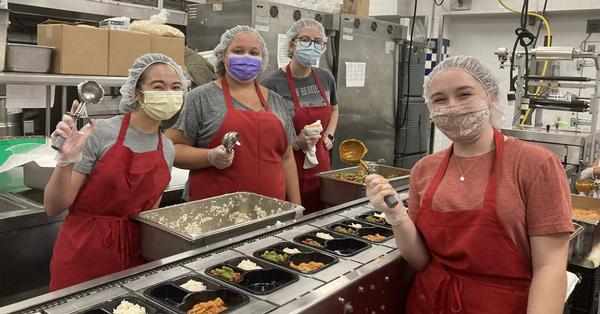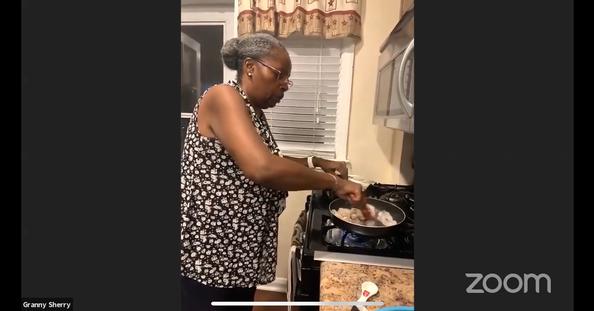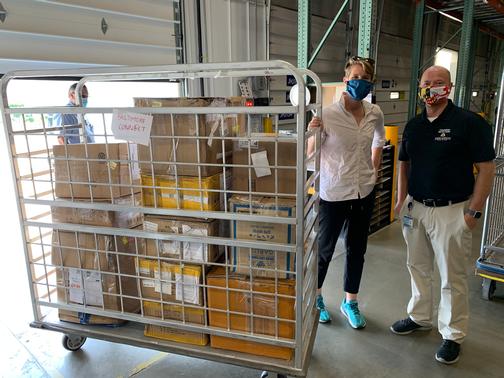Johns Hopkins Students Pack 2,000 Meals for Meals on Wheels of Central Maryland
Medical imaging students volunteer time, learn about teamwork

Medical imaging students Sharmaine Moore, Maria Cosentino, Christy Van Aken and Natalie Giovan volunteer at Meals on Wheels of Central Maryland.
In December, the diagnostic medical sonography students at The Johns Hopkins Hospital chose to package meals for Meals on Wheels of Central Maryland. The group assembled 2,000 meals over a four-hour shift. Student Maria Cosentino says the group, in choosing a volunteer opportunity, thought feeding people was the best way they could help.
“You can see the impact you have,” says Cosentino, one of 11 students who volunteered. “It was an upbeat environment, and we got to work as a team. It felt great to accomplish a goal and help other people.”
Diagnostic medical sonography students complete an 18-month program, learning how to perform different ultrasounds while completing clinical internships at area hospitals. The program is part of the Johns Hopkins Schools of Medical Imaging, which includes the radiography program and the nuclear medicine technology program.
Schools of Medical Imaging director Sandra Moore says all of the schools’ programs have had the same community service requirement for decades.
“Not only are we here to train technologists who are competent and safe, we also want them to understand what it’s like to be part of Johns Hopkins and give back to the community,” Moore says. “We feel strongly that in order to do this, students should complete one community service project at a Baltimore City organization.”
Moore says past students have chosen projects that included painting, landscaping and food service.
“They pick something in the city and organize it themselves,” she says. “We want them to understand that a great deal of our patients need support in other ways. We’re trying to make them good employees who are worthy of being at Hopkins.”
The diagnostic medical sonography students packed meals in a massive room with several conveyor belts. Each student had a station and was tasked with filling trays from huge bins of food that had just been cooked.
“We ended up having a lot of laughs with it because you can adjust the speed of the conveyor belts,” student Natalie Giovan says. “Time just flew because we were having so much fun. We had music on and people were singing and dancing. There was so much joy, and it felt good to be part of that.”
Amy Dell, Meals on Wheels of Central Maryland’s volunteer support services specialist, worked with the students during their shift.
“I loved working with the Johns Hopkins diagnostic medical sonography students!” says Dell. “Their energy and enthusiasm were incredible, especially at 8 a.m. It was obvious that they truly cared about the work and the fact that they were helping people by volunteering with us. The students helped us prepare our meals that get delivered to thousands of clients, enabling homebound individuals in our community to live independently at home. During the holiday season, we need a ton of help, and we’re so grateful to Johns Hopkins students for answering that call.”
Julie Hollander, Meals on Wheels of Central Maryland’s senior director of volunteer support services, described the students as hardworking and enthusiastic volunteers.
“Volunteers are at the core of what we do,” says Hollander. “We couldn’t serve the people we do without volunteers. We went from supplying 25,000 meals a week to 75,000 meals a week at the height of the COVID-19 pandemic. Our whole model for how we serve people is dependent on volunteers.”
Student Laura Schwabenbauer says the Meals on Wheels team made it easy to volunteer.
“It was a hassle-free process,” Schwabenbauer says. “They made everything so simple. The staff was so welcoming, and working with them was so nice. We learned how fortunate a lot of us are to be able to have food on the table and in the fridge.”
“We liked that it was something we could spend a couple of hours doing,” adds Giovan. “We wanted to find something to do together. It’s been hard to get together because of the pandemic, so we had a lot of fun with it. We’re all really close now.”
Student Christy Van Aken says she hopes the group’s work shows the Meals on Wheels recipients that someone cares.
“Food is one thing we all have in common,” Van Aken says. “It’s sad to think about people who can’t leave their homes to get food, like the elderly and medically unable. I think volunteering is something I should do more often. It’s important to reach out to those people.”


